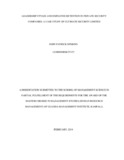| dc.description.abstract | This study addressed the relationship between leadership styles and employee retention using case study of Ultimate Security Limited (USL) in Uganda. The specific objectives of this study were: to establish how democratic leadership style influences employee retention; to find out how autocratic leadership style affects employee retention; and to establish how laissez-faire leadership style influences employee retention in USL. Empirical data was collected on three managerial leadership styles of democratic, autocratic and leissez-faire. Using case study research design, information was collected from 111 respondents comprising of top managers, operation officers, supervisors, guards and trainees. Respondents were selected using systematic and purposive sampling techniques. Data was collected using questionnaires and interviews. The study used both quantitative and qualitative methods of data analysis, with help of SPSS. Empirical data revealed that there is a positive relationship between democratic, autocratic and laissezfaire leadership styles and employee retention. The Pearson correlation test was conducted and the results shown that leadership styles are related to employee retention at USL. Regression analysis was also conducted and the result shown that the three managerial leadership styles were strong predictors of employee retention in USL. Democratic leadership however, showed negative effect on employee retention at USL due to limited application, autocratic leadership also showed negative effect on retention due to its strong application and leissez- faire showed negative influence on retention of employees due to limited application contrary to the recommendation of path goal theory of leadership. The study therefore recommended that leaders at USL should inculcate democratic leadership by empowering workers with leadership positions and decision making; leaders need to communicate and listen to guards and trainees and motivate them using other basic needs such as offering them food and accommodation. USL also needs to reduce on the level at which autocratic leadership is applied by giving workers opportunity to go for further training to improve on their skills so that they are trusted on ability to perform without close supervision and commands. USL also needs to elevate the application of leissez-faire leadership from the current level by a allowing a degree of freedom to employees to do their work but while monitoring and giving them feedback on the level of maturity, commitment and productivity | en_US |

